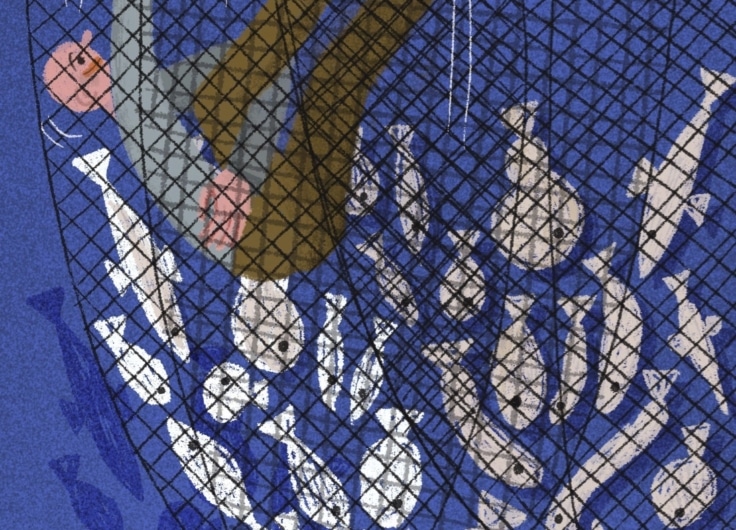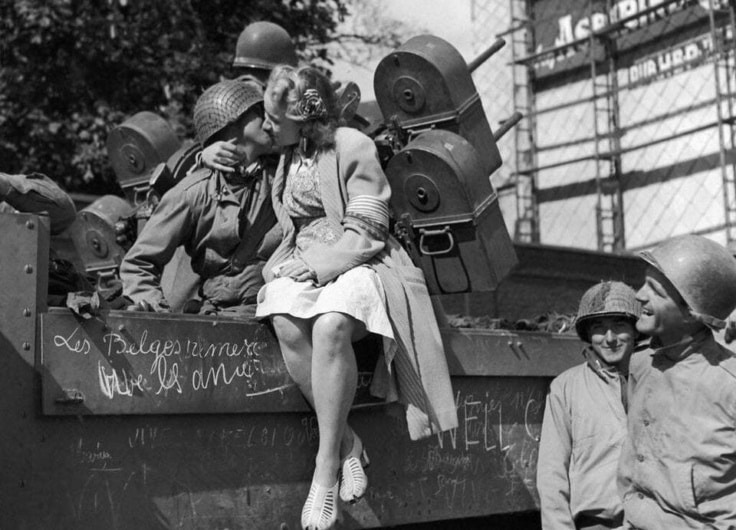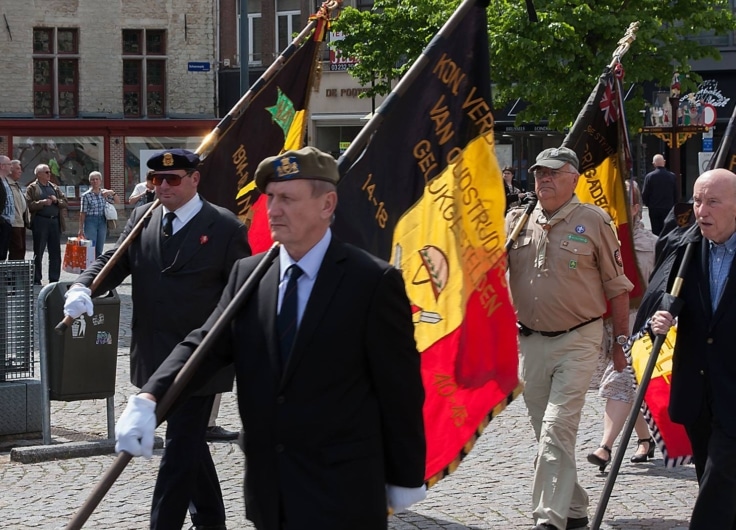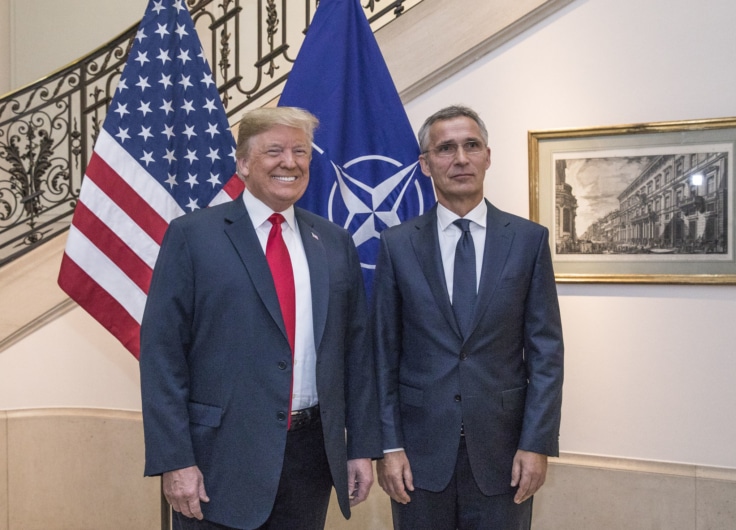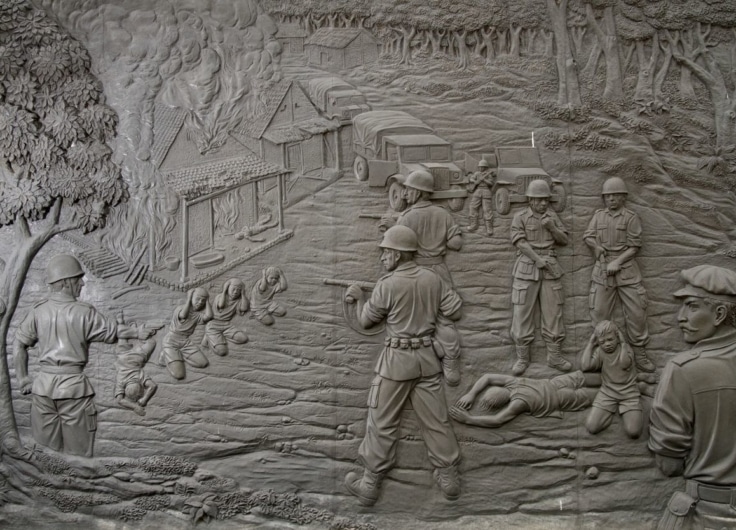How Big Is Belgium’s Love Still for Europe?
After the Second World War, Belgium was one of Europe’s founders. Over the years, Belgian politicians have played a prominent role in European politics. There was always a shared feeling among the population that integration with Europe was useful and in the national interest. In recent times, however, this consensus has been somewhat worn down.
In 2009, the first President of the European Council to be appointed was a Belgian, when Herman Van Rompuy became “President of Europe”. Five years later Donald Tusk, a former prime minister of Poland, took over the helm. And five years after that, in 2019, the role fell to a Belgian once more: Charles Michel fit the jigsaw of nominations and was asked by his colleagues to chair the European Council. Belgians have quite often had a steering role in European politics. Belgium was one of the founders of the European project, and has played a very active role over the years in its process of integration.
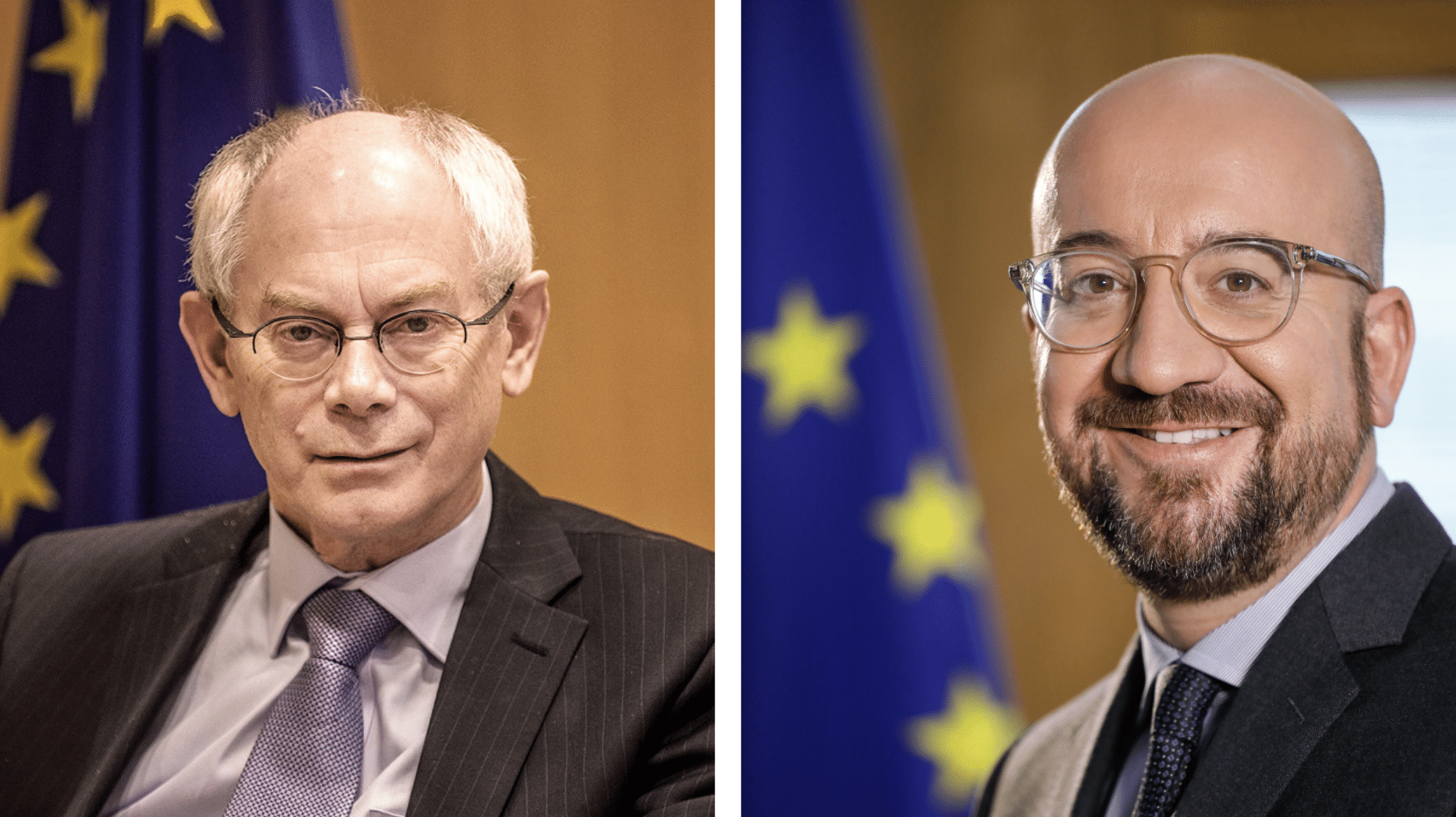 Herman Van Rompuy and Charles Michel, the first and current President of the European Council
Herman Van Rompuy and Charles Michel, the first and current President of the European CouncilMuch has changed over the past seventy years: the Community with a focus on coal and steel has grown into a European Union that plays a significant role in almost all economic and political spheres. Membership has increased spectacularly, from six to 28 countries. In their 2016 referendum, the UK voted to leave the EU, but several other countries hope one day to join. The public discourse about European politics is no longer the same either: the peace project of former times has become increasingly controversial. In this contribution, we look at how Belgium’s views of the project have changed over the years and how the country has left its mark.
Benelux as testing ground
After the Second World War, Belgium wanted to form an economic union with the Netherlands and Luxembourg. In a way, the Benelux project was the testing ground for European integration, though it was soon overtaken by it.
On the initiative of French politicians Jean Monnet and Robert Schuman, plans were forged to allow France and Germany to collaborate intensively in the domain of coal and steel. The three Benelux countries signed up immediately, as did Italy. The European Coal and Steel Community (ECSC) was established in 1951. For the first time, countries were willing to transfer power to a supranational agency. A High Authority, the predecessor of the European Commission, became the central institution. Its power was real, though limited to the management of certain aspects in the coal and steel sector.
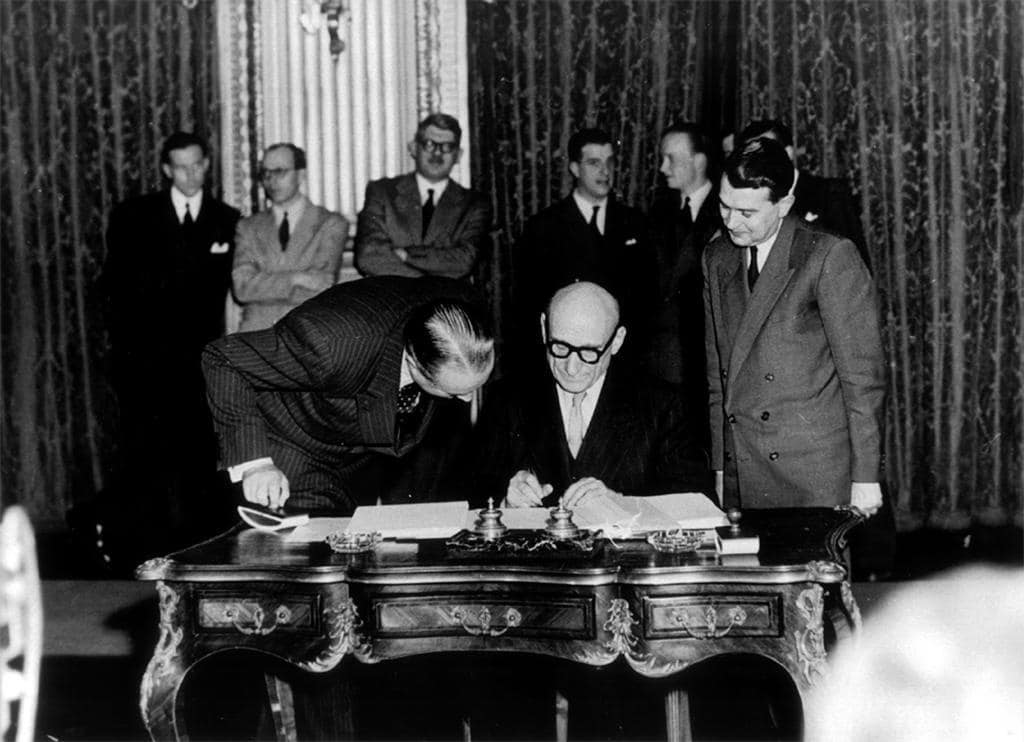 On 18 April 1951, Robert Schuman, French Foreign Minister, signs the Treaty establishing the European Coal and Steel Community (ECSC)
On 18 April 1951, Robert Schuman, French Foreign Minister, signs the Treaty establishing the European Coal and Steel Community (ECSC)A few years later, the Netherlands proposed that the ECSC should become a genuine economic community with a common trade policy. The borders between participating countries would gradually need to disappear. In other words, a Benelux but “on a larger scale”. Belgium and Luxembourg supported the Dutch initiative almost immediately.
Negotiations, which of course also involved the other three ECSC countries – France, Germany, and Italy – were conducted in the Val Duchesse castle in Brussels. Belgium’s then Minister of Foreign Affairs, Paul-Henri Spaak, led the talks. The treaties that followed were signed in Rome in 1957. From then on, a European Economic Community (EEC) was to be developed and there was to be intensive cooperation in the field of nuclear energy (Euratom).
The economy is a priority
In his extensive study of Belgian foreign policy between 1830 and 2015, Rik Coolsaet explains how the country’s economic interests have been and still are a priority. It was not the case that Europe was an “ingrained” reflex, or that Belgium would automatically support anything that sought to strengthen the central European institutions. It was also not the case that enthusiasm for European cooperation was widely shared.
Belgium didn’t engage in European politics out of idealism but out of self-interest
After the Second World War, the Christian Democrats, among others, were still afraid of getting their feet wet and it was only through the Social Democrat Paul-Henri Spaak that Belgium really engaged in European politics. This was not a question of idealism but primarily one of self-interest.
The ECSC provided a convenient way to channel European taxpayers’ money into the loss-making coal mines. The painful closures of the mines would later be said to be “Europe’s” doing. That Belgian politicians were in favour of increased economic cooperation on a European level, after several years of protectionism, should not be so surprising. After all, the majority of trade flowed to and from Belgium’s neighbouring countries. Belgium has always remained an open economy and it has consistently encouraged reducing European borders.
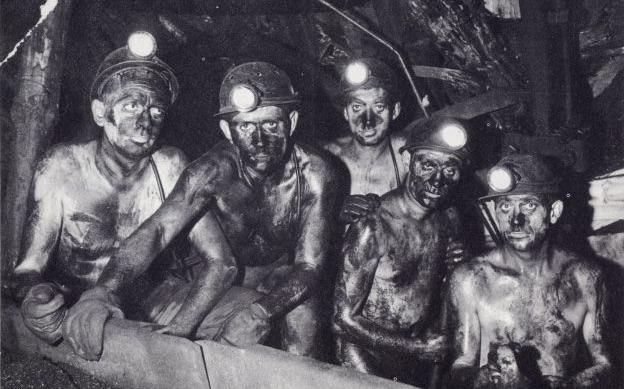 The ECSC provided a convenient way to channel European taxpayers’ money into the loss-making coal mines.
The ECSC provided a convenient way to channel European taxpayers’ money into the loss-making coal mines.When the EEC was established, Belgium, together with France, also advocated the development of a common social policy. Since workers benefited from a relatively high level of social security, it would be good for the competitiveness of the market if across Europe the same high standards were applied. As most other member states did not wish to implement them, the mission was only partially successful.
When plans to establish a monetary union became more concrete around 1990, Belgian diplomacy did everything it could to be part of it. If important trading partners deal in the same currency, it works to their advantage. Having to switch currency with each transaction, with all the associated costs, is not so efficient. In addition, the risk of sudden devaluation remains, which could disrupt trade flows. Nonetheless, the Maastricht Treaty (1992) stipulated strict criteria with which countries had to comply if they wanted to introduce the single currency. Belgian government debt was far too steep and would need to decrease spectacularly in a short time. The government made drastic savings, but at the same time continued diplomatic efforts to obtain a flexible interpretation of the criteria. With success: when the euro was introduced in 2002, Belgium was included.
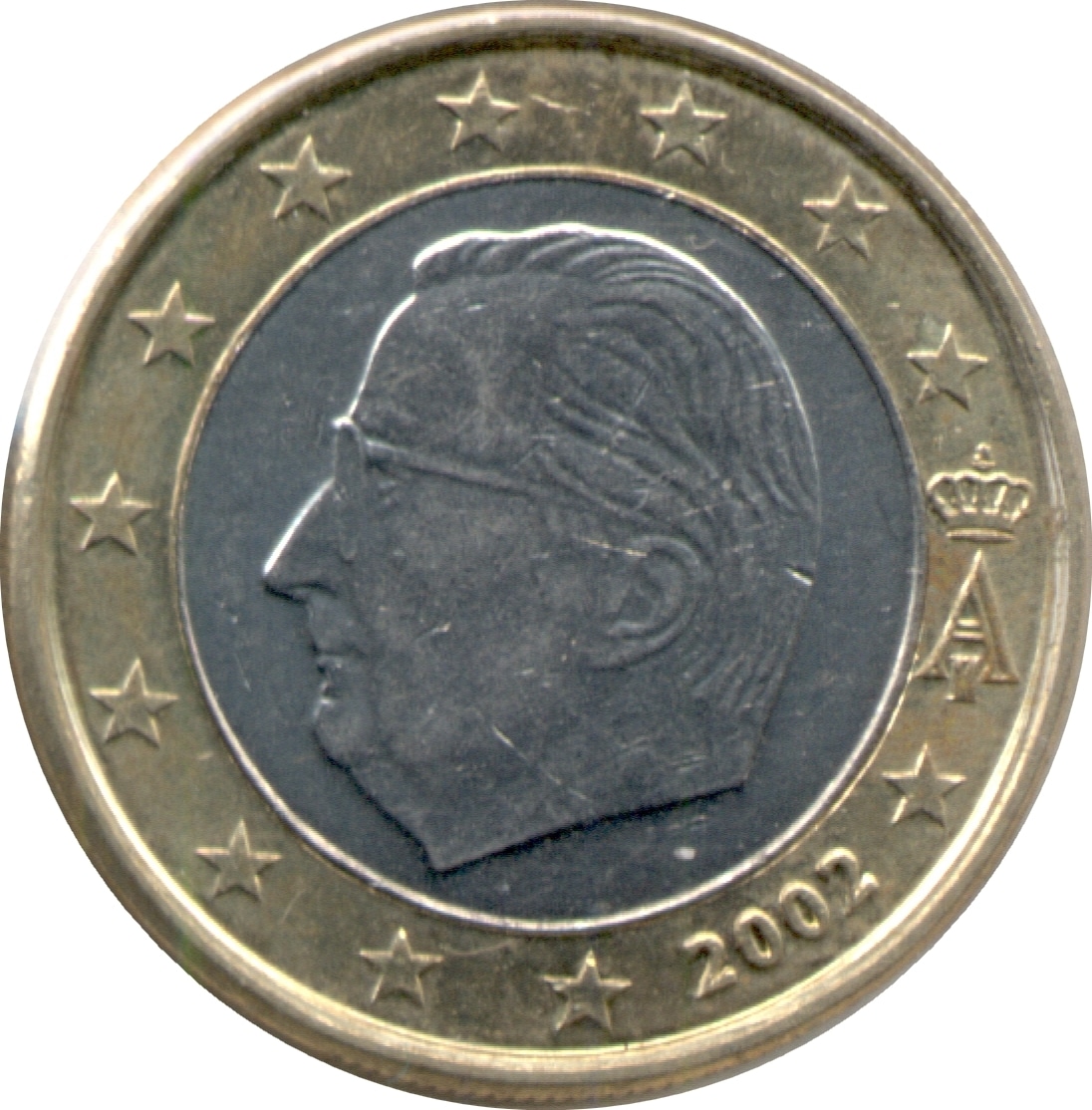 The euro banknotes and coins were introduced in Belgium on 1 January 2002
The euro banknotes and coins were introduced in Belgium on 1 January 2002In the negotiations that led to the Maastricht Treaty, the idea of establishing a far-reaching European Political Union also took root. On this topic Belgium made less of an effort, from which it is possible to conclude that even in that period the Belgian position was still less driven by idealism than by economic interests and pragmatism.
The United States of Europe
Nevertheless, Belgium gradually shifted to a position that can be labelled pro-European almost across the board. Pro-European meaning that Belgium primarily seeks to strengthen the European institutions and further transfer powers to the European level. The motto became: increased European integration is good for Belgium. This evolution incidentally was also fuelled by the emergence of regionalist parties. For them, a strong Europe stood for further stripping back the Belgian state.
This even led to Belgium taking a relatively critical stance on the expansion to Central and Eastern Europe but actually this stance had more to do with fears that a large Union would have a potentially less far-reaching impact and would be weakened.
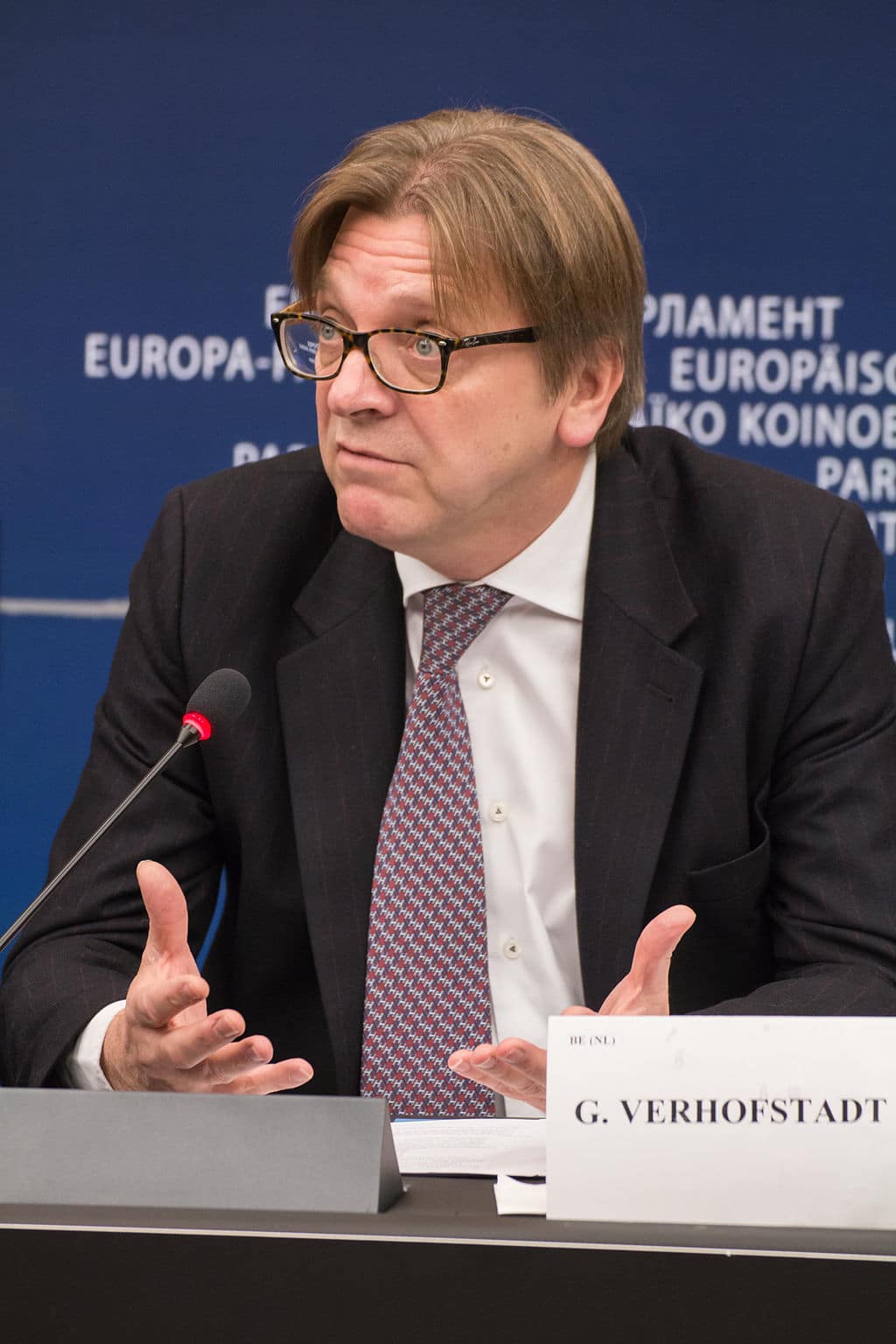 Guy Verhofstadt, former Prime Minister of Belgium
Guy Verhofstadt, former Prime Minister of Belgium© Wikipedia
In 2005 then Prime Minister Guy Verhofstadt, in his book The United States of Europe, explicitly advocated the establishment of a federal Europe. Earlier, in 2003, he had campaigned for a European-wide defence. That was controversial because the Americans had just started a war against Iraq. Europe was deeply divided: the British, and several other, mainly Eastern European, member states supported the United States. Other European countries, including France and Germany, opposed the war. To move things forward, Verhofstadt organised a summit with France and Germany. At the time, among other things, establishing a European defence headquarters was on the agenda. Opponents of a European defence union spoke disdainfully of the “praline summit”.
Compared to other member states Belgians have generally had great confidence in the European institutions throughout history
Whereas in the early phases of the EU Belgium mainly supported economic unification, seeing little advantage in a political union, this has gradually changed. Incidentally, this enthusiasm for European cooperation was supported by public opinion: Eurobarometer surveys show that compared to other member states Belgians have generally had great confidence in the European institutions throughout history. With regard to Europe, there was a permissive consensus. Passion it was not, just a shared feeling that European integration was useful and in the national interest.
The presence of this pro-European attitude among the population, and certainly among the political elite, did not mean that Belgium rallied behind every European initiative. If there were proposals on the subject of more cooperation on taxation (for example taxes on savings), the government put the brakes on during negotiations. In general, however, the big plans, often developed under the lead of France and Germany, were enthusiastically supported.
Defender of the small member states
The fact that Belgium often agrees with Franco-German plans does not mean that it has no concerns about the position of the smaller member states. When Charles De Gaulle was the President of France in the 1960s, a proposal was launched from his entourage for increased political cooperation, under the so-called Fouchet Plan. It drew fierce criticism from Belgium and the Netherlands. Firstly, because the need for political cooperation was not yet so strongly felt and secondly because the plan was of a very intergovernmental nature. It meant that the real European institutions such as the Commission or the Court of Justice would have little impact. Decisions would be made by the leaders of the member states, their representatives, or delegates. In such a context, practically speaking the larger countries carry more weight, while smaller member states count for less.
This fear of the emergence of a “directoire”, in which a handful of large member states make the decisions, has gradually led Belgium to argue more emphatically for a stronger role for the European Commission and the European Parliament. These “real” European institutions, which take precedence over the member states (supranational), were seen as a better way to guarantee the interests of the smaller countries.
However, mistrust of the larger member states, France in particular, has never been as pronounced in Belgium as in the Netherlands. In the Netherlands, the suspicion that large countries conspired to elbow out the smaller partners is almost ingrained.
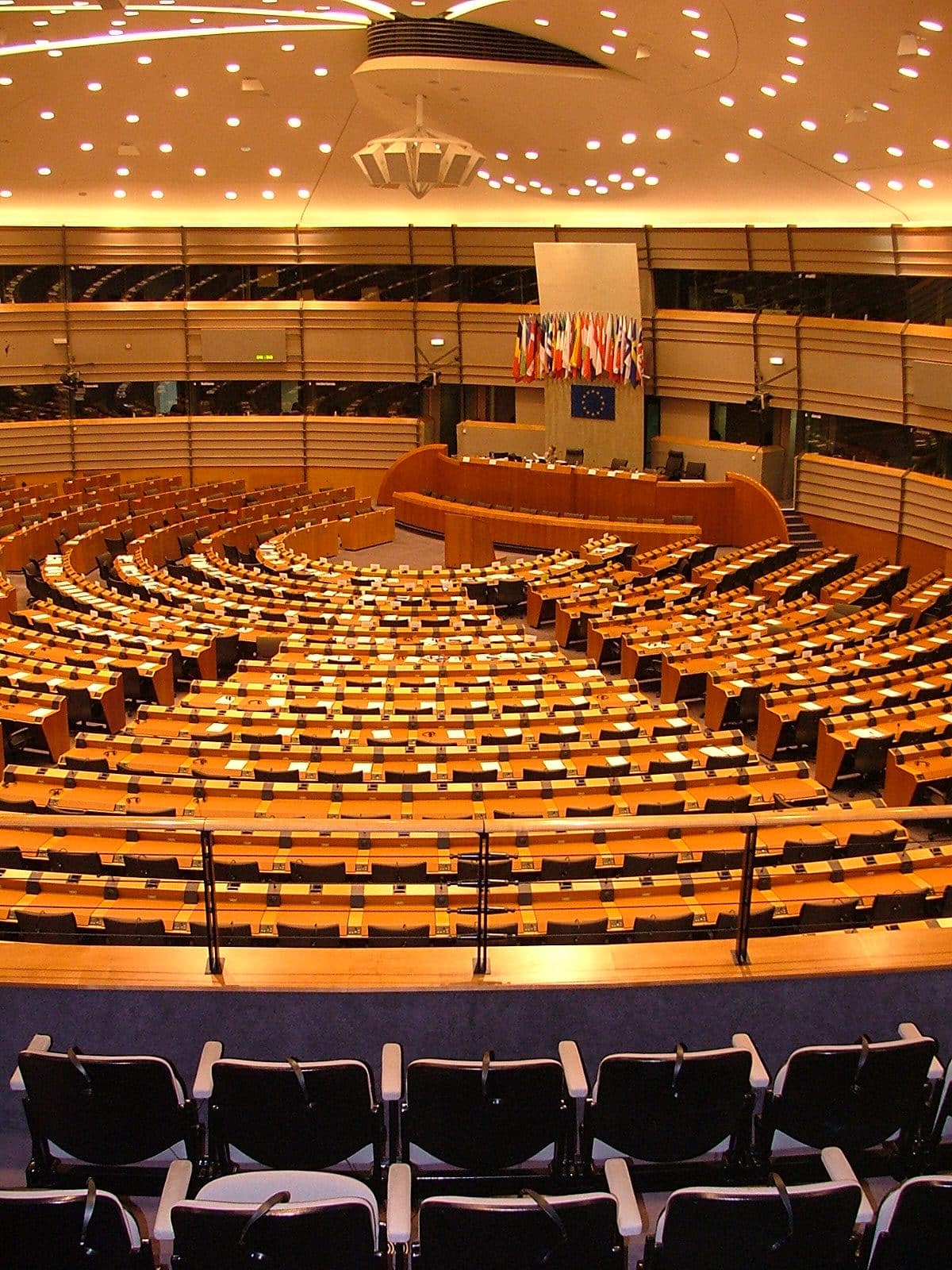 The European Parliament in Brussels
The European Parliament in BrusselsHowever, these different sensitivities have not prevented Belgium and the Netherlands, often together with Luxembourg, from opposing intergovernmental deals suspected of working in favour of the bigger countries. When the European Council was established in the 1970s and it was agreed that heads of state or government of the member states would meet regularly, it met with Benelux resistance. The Benelux feared that this new body would undermine the power of the Commission. The protest was in vain, because the European Council was established nevertheless. Yet thirty years later, when a proposal was tabled to strengthen the European Council by appointing a permanent chair, that too met with Benelux resistance. It was feared that this new “president” would get in the way of the President of the Commission.
Belgium and the Netherlands drew the short straw once again, because the permanent role was inaugurated anyway. Ironically, the first President of the EU Council was a Belgian, Herman Van Rompuy. And so is the third, Charles Michel.
Increased grumbling
So Belgium gradually became a trailblazer: more European integration was considered desirable. That was hardly contested politically. It was only the far right who waved the flag of sovereignty and did not want to give up extra powers to Europe. It was never a major theme in elections. In the early 2000s there was also some grumbling among the Social Democrats, who did not think the European trajectory was social enough. But when it came down to it Belgium always argued for additional European powers.
While Belgium still defends “more Europe” in principle, this is no longer without reservations
That consensus has recently come under attack. The Flemish nationalist party N-VA, which has since become the largest in the country, calls itself “Eurorealistic”, and does not buy the story that further European integration has only advantages. While Belgium still defends “more Europe” in principle, this is no longer without reservations.
In terms of content, there are sometimes specific issues where Belgium puts the brakes on. This was already the case concerning taxation (as mentioned above), but in 2018 and 2019 it could also be seen in the climate change dossier. In several votes, Belgium rejected the more ambitious European proposals on the table.
From that perspective, it is no longer easy for Belgium to play the role of benevolent builder of bridges, with a view to reaching compromises and unblocking stalemates, that it has gradually appropriated for itself in European politics.
European politics is complex in Belgium
Another dynamic that has hindered the European performance of the Belgian government for some time now has to do with the Community tensions which surface occasionally, and which also have a European dimension. For a long time, the concept of “Europe” was not a source of conflict between the Flemish and the Walloon regions. However, as the EU became active in an increasing number of policy areas, tensions slowly formed. After a series of state reforms, the regions have acquired important powers. Naturally, they each want to be involved in European decision-making and in determining a common Belgian position.
When Belgium has to adopt a European position in the Council, all six governments must give their consent
That this is sometimes a problem becomes apparent when Belgium has to adopt a European position in the Council. To do so, all six governments (the federal government, the Flemish government, the government of the Walloon Region, the government of the French-speaking Community, the government of the German-speaking Community and the government of the Brussels Region) must give their consent. This institutional complexity is sometimes paralysing: if governments cannot agree, Belgium must abstain. In 2016, this made world headlines: the Walloon government opposed the adoption of a free trade agreement with Canada. As a result Belgium had to abstain, which meant that the treaty could not be approved. In this way, one small region managed to block an entire continent from reaching a trade agreement, which has led to considerable resentment in the political corridors of Europe. While the Walloon government eventually reversed its position, the image of the Belgians as builders of bridges was undermined.
(continue reading below the illustration)
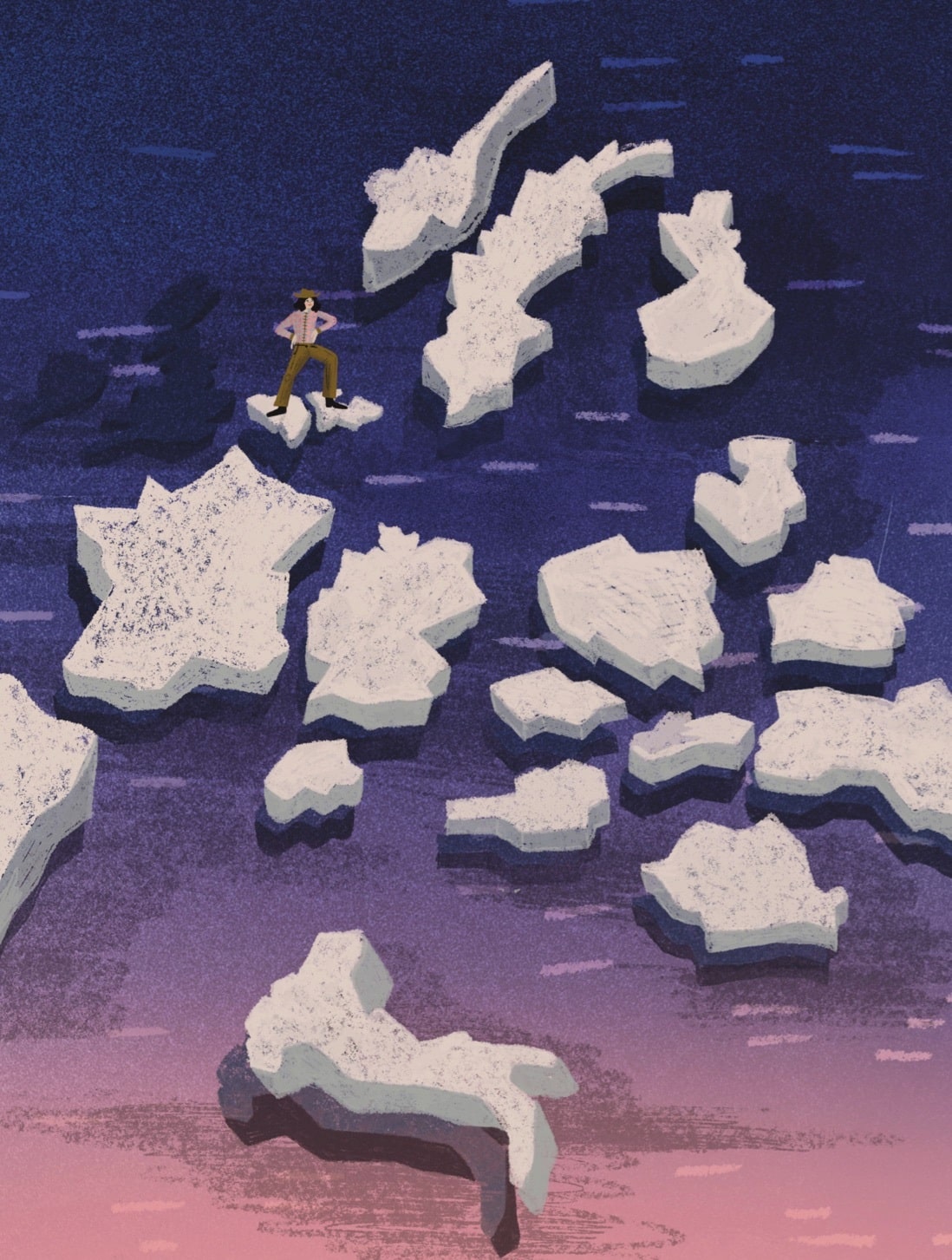
© Trui Chielens
Europe is Belgium on a larger scale
Belgians have played a prominent role in Europe over the years. Paul-Henri Spaak was behind the EEC. Later, in the 1970s, the then Prime Minister Leo “Mr. Europe” Tindemans planned for Europe’s future. High-ranking diplomat Etienne Davignon championed greater cooperation in the field of foreign policy and in 1974 initiated the informal Gymnich meetings between foreign ministers in the EU. Karel Van Miert is still today considered to be one of the most powerful members of the European Commission there has ever been. Former Prime Minister Wilfried Martens co-founded the European People’s Party. His colleague Jean-Luc Dehaene almost became President of the Commission, and was on the board of the Convention that prepared a constitution for Europe. Yet another former prime minister, Guy Verhofstadt, has continued to play an important role in the European Parliament. In addition, many Belgian negotiators often acted as mediators.
Recent examples of Belgians gaining important European positions in turbulent times are Herman Van Rompuy and Charles Michel. It is clear that the Belgian political establishment has traditionally been able to identify very strongly with the European project and the integration of the European continent. The experience that Belgian politicians and diplomats have in reaching compromises is certainly a contributing factor. Despite, or perhaps thanks to, the increased political complexity, both in Europe and in Belgium, identification with the European project remains strong today.
Belgian prime ministers lead governments in which different language groups are represented, and where diverging ideological tenets come together. Each state wants to have its way and does not wish to concede power. Belgian politicians are used to negotiating late into the night and eventually agreeing to compromise. Although sometimes held together only by a thread, such deals generally serve to defuse the worst of crises.
It is because Europe is, in a sense, “Belgium on a larger scale”, that the qualities a successful Belgian politician possesses are often exactly those sought after at the European level.
This article is the English translation of België in het groot?
België en de Europese integratie, published in the book Nulpunt 1945 (Zero Point 1945, Ons Erfdeel vzw, 2020).




